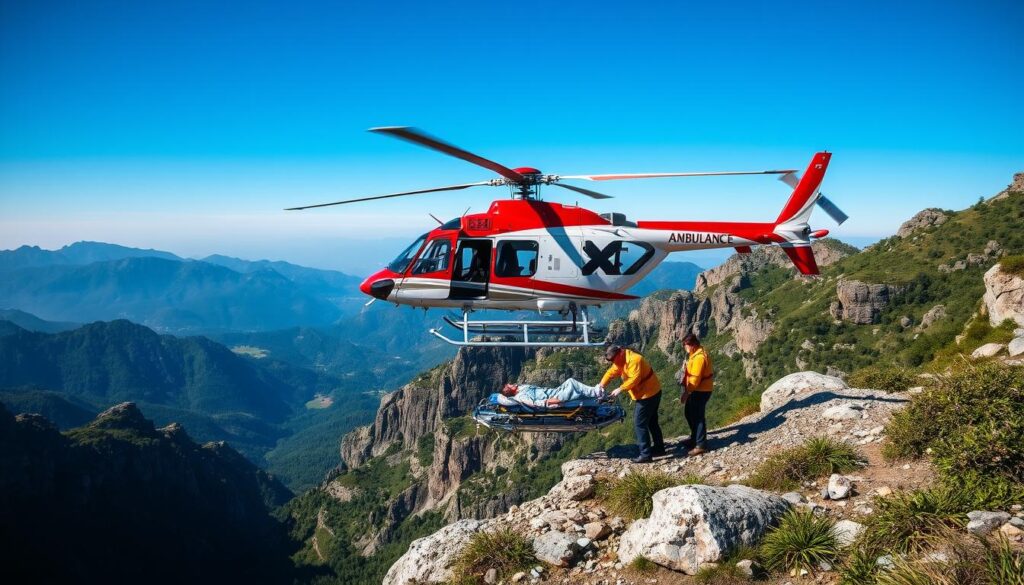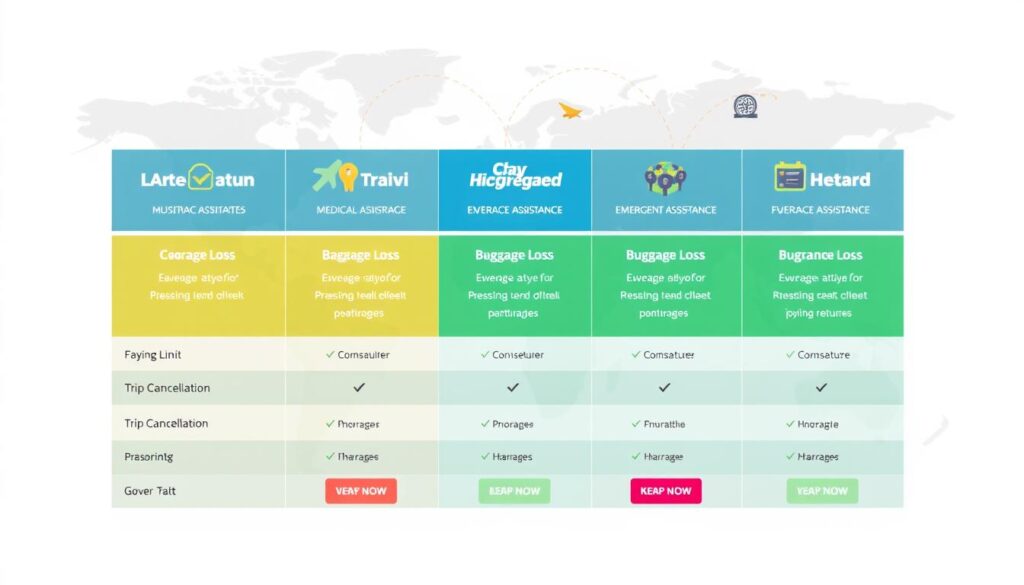Traveling is exciting, but it also has its risks. That’s why travel insurance is so important. It protects you from unexpected events like trip cancellations and medical emergencies. It also keeps your belongings safe, so you can enjoy your vacation without worry1.
In recent years, travel insurance has become even more crucial. The White House introduced new rules for airlines in April 2024. These rules require airlines to automatically refund you for flight changes, delays, or cancellations. This shows how vital it is to have good coverage for your travel plans and money1.
Key Takeaways
- Travel insurance provides financial protection against unexpected events during trips.
- It typically costs between 4-10% of the overall trip price and can cover trip cancellation, medical expenses, emergency evacuation, and baggage loss.
- The White House has mandated automatic refunds for airline flight changes, delays, or cancellations, highlighting the importance of comprehensive travel insurance.
- Various types of travel insurance coverage are available, and it’s crucial to choose a plan that aligns with your specific travel needs.
- Considering the potential high costs of medical emergencies and evacuation, travel insurance can be a valuable investment to protect your trip and financial well-being.
Understanding Travel Insurance Basics
Types of Travel Coverage Available
When to Purchase Travel Insurance
Who Needs Travel Protection
“Travel insurance can provide a valuable safety net for unexpected events, from medical emergencies to trip cancellations.”
Cost and Value of Travel Insurance
Comprehensive policies can cost over $400, while medical-only policies are under $1004. In 2024, Cancel For Any Reason policies average $632.
“The value of travel insurance is determined by its usefulness during travel emergencies, justifying the cost.”
Think about the cost of travel insurance and its benefits4. The initial cost is worth it for the protection and peace of mind it offers.
Trip Cancellation and Interruption Coverage
Travel insurance is key, especially for trip cancellation and interruption. Trip Cancellation Insurance helps pay for lost travel costs if you can’t go due to a covered reason6. Trip Interruption Insurance covers losses during your trip, like returning home early or last-minute flight costs6. These are often sold together with Travel Medical Insurance6.
What Qualifies for Cancellation Claims
Reimbursement Policies and Limits
Cancel for Any Reason (CFAR) Options
Medical Coverage While Abroad
Traveling internationally often means your regular health insurance won’t cover you. That’s where travel medical insurance steps in. It pays for doctor visits and hospital stays during emergencies abroad8. With coverage from $50,000 to $2,000,000 for emergencies, and up to $500 for dental, it offers peace of mind and financial security8.
Baggage and Personal Belongings Protection
Coverage Limits for Lost Items
Filing Claims for Lost Luggage
Excluded Items and Situations
Emergency Evacuation and Repatriation Benefits
Traveling requires the right insurance, especially for emergency medical evacuation and repatriation. These benefits are crucial if you face a life-threatening situation or need to return home.

Travel Insurance: What You Need to Know
Common Coverage Exclusions
Travel insurance has exclusions you should know about. Travel insurance exclusions often include pre-existing medical conditions and extreme sports. Also, travel to high-risk areas is usually not covered15. Always check the policy terms to know what’s not included.
Policy Terms and Conditions
Understanding policy terms and conditions is key. Look for details like claim deadlines and what’s not covered15. Some plans offer more coverage, while others are cheaper. It’s smart to compare and read the fine print.
Pre-existing Condition Considerations
Many policies don’t cover pre-existing conditions. But, some offer waivers if you buy the policy soon after booking15. This is good for those with health issues who want to travel safely.
“Approximately 20-25% of travel insurance policies cover trip cancellation or travel disruption, providing financial protection for investments in flights, cruises, or train tickets.”16
Comparing Insurance Providers and Plans
When looking at travel insurance, it’s key to compare different providers and plans. This ensures you get the right coverage for your needs. Top travel insurance companies like Nationwide Travel Insurance, AXA Assistance USA, and C&F Travel Insured offer various insurance plan options. These options have different benefits and prices17.
Online tools like SquareMouth can help simplify this comparison. You just need to enter your trip details. Then, you can see quotes from several providers. This makes it easy to compare coverage, customer service, and claim histories18.
Some insurers offer special benefits, like coverage for kids under 17 or protection for vacation rentals. When looking at travel insurance plans, think about what you need most. Compare plans carefully to find the best one for your trip17.
| Provider | Financial Strength Rating | Average Price | Trip Cancellation Coverage | Reimbursement Options | Customer Rating |
|---|---|---|---|---|---|
| Nationwide Travel Insurance | A- | $206 | Up to 100% of trip costs for cruises or up to $30,000 for single-trip plans | Up to 200% | 4.5/5 |
| AXA Assistance USA | N/A | $218 | Up to 100% of the trip cost | Up to $1 million | 4.17/5 |
| C&F Travel Insured | A | N/A | N/A | N/A | 4.33/5 |
Also, companies like Tin Leg, Seven Corners, Trawick International, Generali Global Assistance, and Berkshire Hathaway Travel Protection are popular. They have strong sales, customer ratings, and reviews19.

By doing your research and comparing travel insurance options, you can choose wisely. This way, you pick a plan that meets your travel needs and budget.
Travel Credit Card Insurance vs. Standalone Policies
Many credit cards offer travel insurance as a perk. But, it’s key to know these benefits have limits. For instance, the Chase Sapphire Reserve® covers up to $1,000,000 for accidents20. Yet, its overall coverage is less than what standalone plans offer.
Standalone travel insurance covers a wide range of issues, like trip cancellations and medical emergencies21. You can also tailor these policies to fit your needs21. On the other hand, credit card protections might not cover everything, like pre-existing medical conditions or high-risk activities21.
When to Choose Additional Insurance
Cancel for Any Reason (CFAR) insurance is another option. It lets you cancel your trip for any reason and get up to 100% of your costs back20.
Filing Claims and Documentation Requirements
The time it takes to process a claim varies. It depends on the company, how complex the claim is, and how fast you send in your documents23. Most companies try to handle claims in 30-60 days. Having everything ready can speed things up23. It’s also good to keep in touch with your insurance company to know how your claim is doing23.
| Travel Insurance Claim Documentation Requirements |
|---|
| – Medical records and reports – Police reports (for theft, loss, or accident) – Receipts for expenses incurred – Proof of travel (e.g., airline tickets, hotel reservations) – Detailed information about the incident |
Remember, the travel insurance claims process is there to help you. By knowing what you need and being ready, you can have a smooth claims experience24.
Conclusion
FAQ
What types of travel insurance coverage are available?
Travel insurance covers many things. It includes trip cancellation, medical expenses, and emergency evacuation. It also covers accidental death, dismemberment, and baggage loss.
When should I purchase travel insurance?
Buy travel insurance after booking your trip. Some benefits need you to buy early.
Who needs travel insurance?
If you’re taking an expensive trip or going to remote areas, get insurance. It’s also good for those with health concerns.
How much does travel insurance cost?
Insurance costs 4-10% of your trip’s price. For a ,000 trip, it’s 0 to 0.
What does trip cancellation coverage include?
It covers non-refundable expenses for illness, death, or natural disasters. You get 100% back for cancellation and up to 150% for interruption.
What does travel medical insurance cover?
It pays for doctors’ fees and hospital bills abroad. It also helps find care that meets U.S. standards.
What does baggage protection cover?
It covers lost, damaged, or stolen items. Coverage is higher than airlines, but cash, jewelry, and heirlooms are usually excluded.
What is emergency evacuation coverage?
It’s crucial for remote areas. It covers air evacuation and medical transport, costing ,000 to over 0,000.
What are common exclusions in travel insurance policies?
Exclusions include pre-existing conditions, extreme sports, and high-risk areas. Always check policy terms, especially claim deadlines and documentation needs.
How do I compare travel insurance providers and plans?
Use sites like SquareMouth to compare. Look at coverage limits, customer service, and claim history. Some offer special benefits like coverage for kids or vacation rental damage.
When should I consider a standalone travel insurance policy instead of credit card coverage?
Credit cards might not cover medical or evacuation. Standalone policies offer more, especially for international or adventure travel.
What documentation is required when filing a travel insurance claim?
Keep receipts, medical reports, and police reports. Provide detailed info about the incident and expenses. Follow up on your claim status regularly.
Source Links
- https://www.cnbc.com/select/travel-insurance-guide/ – Is travel insurance worth it?
- https://www.investopedia.com/terms/t/travel-insurance.asp – What Is Travel Insurance, and What Does It Cover?
- https://www.travelinsurancecenter.com/travel-411/understand/ – Understanding Travel Insurance
- https://www.squaremouth.com/travel-advice/cost-for-travel-insurance – How Much Does Travel Insurance Cost in 2024?
- https://www.bhtp.com/how-much-does-travel-insurance-cost/ – How Much is Travel Insurance? It’s More Affordable Than You Think
- https://www.cafii.com/trip-cancellation-interruption-insurance/ – What are Trip Cancellation and Trip Interruption Insurance? – CAFII
- https://www.nerdwallet.com/article/travel/trip-cancellation-insurance-explained – Trip Cancellation Insurance Explained – NerdWallet
- https://www.nerdwallet.com/article/travel/travel-medical-insurance-emergency-coverage-travel-internationally – How Travel Medical Insurance Works – NerdWallet
- https://www.tdi.texas.gov/tips/travel.html – Travel insurance: What does it cover and when do you need it?
- https://www.travelers.com/resources/travel/travel-medical-insurance-guide – How Much Medical Travel Insurance Do I Need? | Travelers Insurance
- https://www.usatoday.com/money/blueprint/travel-insurance/baggage-insurance/ – How travel insurance works for baggage
- https://www.squaremouth.com/travel-insurance-benefits/baggage-and-personal-items-loss – Baggage Loss Insurance: Coverage For Personal Items
- https://www.internationalstudentinsurance.com/explained/medical-evacuation-repatriation-insurance.php – Medical Evacuation & Repatriation Insurance | Insurance Explained
- https://www.squaremouth.com/travel-insurance-benefits/medical-evacuation-and-repatriation – Medical Evacuation Insurance: Coverage Details & Plans
- https://www.ricksteves.com/travel-tips/trip-planning/travel-insurance – Do I Need Travel Insurance?
- https://wwwnc.cdc.gov/travel/page/insurance – Travel Insurance | Travelers’ Health
- https://www.businessinsider.com/personal-finance/travel-insurance/best-travel-insurance-companies – Ultimate Guide to Choosing the Best Travel Insurance
- https://covertrip.com/compare-travel-insurance – How to Compare Travel Insurance Companies
- https://www.squaremouth.com/best-travel-insurance – Best Travel Insurance Companies of 2024 – Squaremouth
- https://www.businessinsider.com/personal-finance/travel-insurance/travel-insurance-vs-credit-card – Credit Card Travel Insurance vs Travel Insurance: A Comparative Guide
- https://thepointsguy.com/credit-cards/when-to-buy-travel-insurance-versus-when-to-rely-on-credit-card-protections/ – What to know about travel insurance and credit card protection – The Points Guy
- https://www.squaremouth.com/travel-advice/filing-a-travel-insurance-claim-step-by-step-guide – Filing a Travel Insurance Claim: Step by Step Guide
- https://www.insureyonder.com/how-does-the-claim-process-work/ – Unlock the Secrets to a Successful Travel Insurance Claim [GUIDE]
- https://blog.withfaye.com/travel-insurance-101/how-to-file-a-travel-insurance-claim-quickly/ – How to file a travel insurance claim quickly – Faye blog
- https://www.melaniemay.com/do-i-need-travel-insurance/ – Do I Need Travel Insurance? An Expert Guide
- https://www.becu.org/blog/do-you-need-travel-insurance – Do You Need Travel Insurance? | BECU





